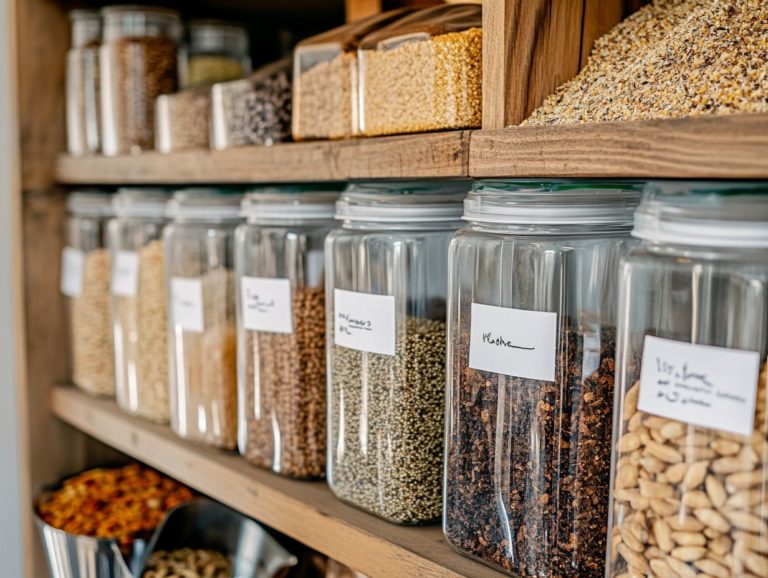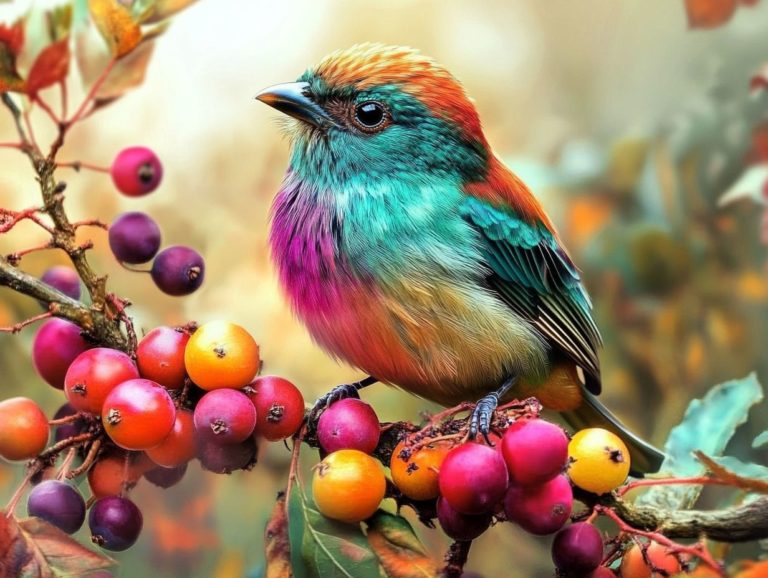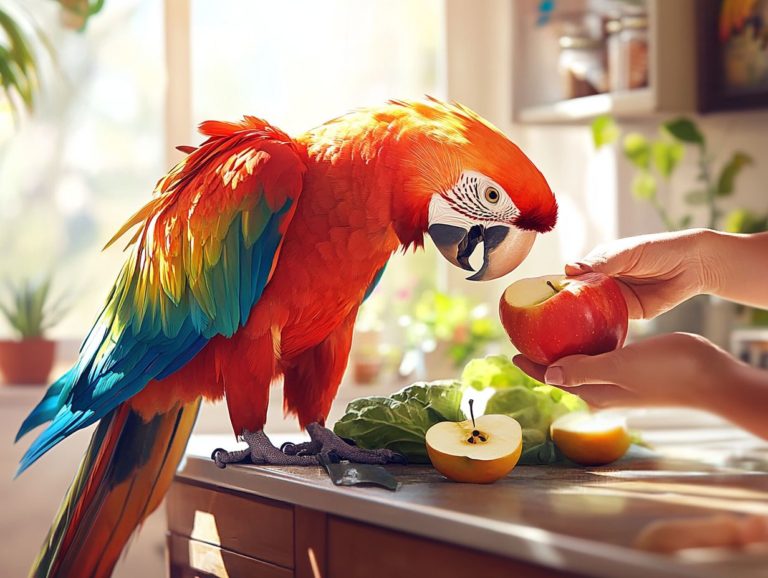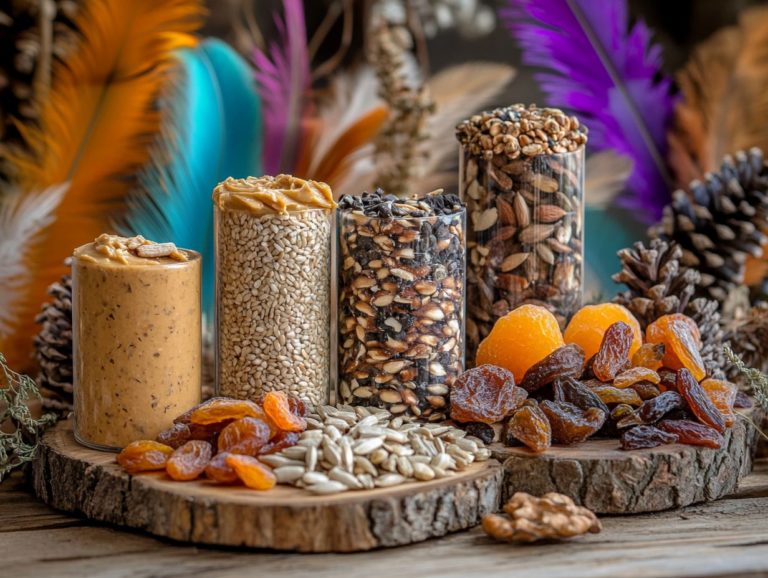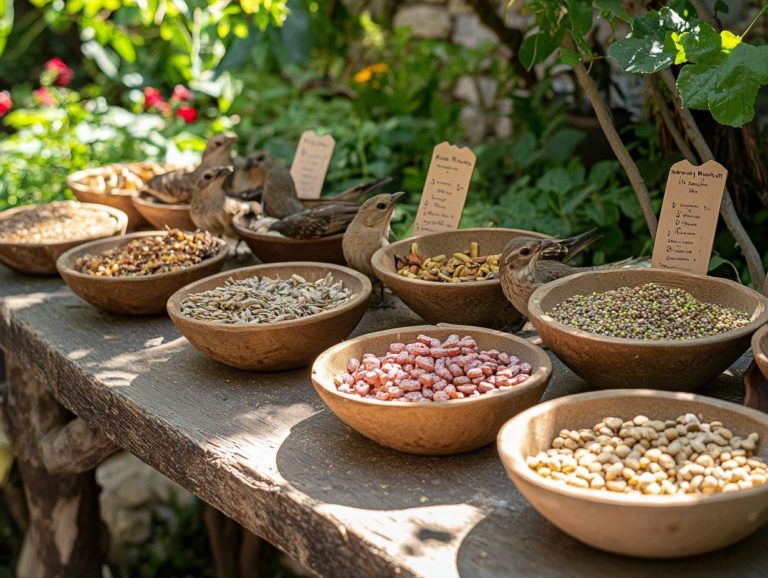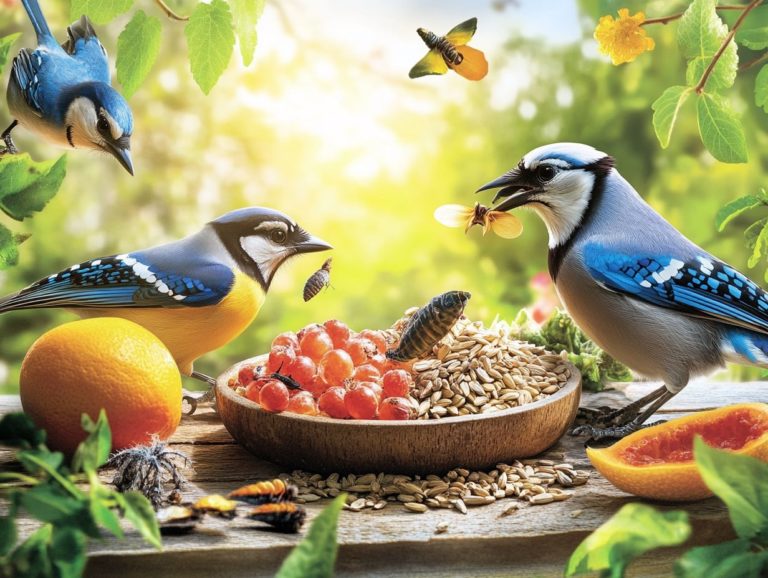Top 10 Nutritious Seeds for Your Pet Bird
Seeds play a crucial role in your pet bird’s diet, supplying essential nutrients and energy they need to thrive.
Dive into the top 10 nutritious seeds that keep your feathered friend healthy and happy. From omega-rich flax seeds to protein-packed hemp seeds, each variety brings unique benefits that can enhance your bird’s meals.
It’s essential to know which seeds to avoid and the importance of a mix of different foods. Equip yourself with knowledge about the best seeds for your avian companion, ensuring they flourish in every way.
Contents
- Key Takeaways:
- 1. Flax Seeds
- 2. Chia Seeds
- 3. Sunflower Seeds
- 4. Hemp Seeds
- 5. Pumpkin Seeds
- 6. Sesame Seeds
- 7. Quinoa Seeds
- 8. Millet Seeds
- 9. Safflower Seeds
- 10. Poppy Seeds
- Why Are Seeds Important for Pet Birds?
- Frequently Asked Questions
- What are the top 10 nutritious seeds for my pet bird?
- Why are these seeds considered nutritious for pet birds?
- Can I feed these seeds as the main diet for my pet bird?
- How should I offer these seeds to my pet bird?
- Are there any seeds that are harmful to my pet bird?
- Can I grow these seeds myself for my pet bird?
Key Takeaways:
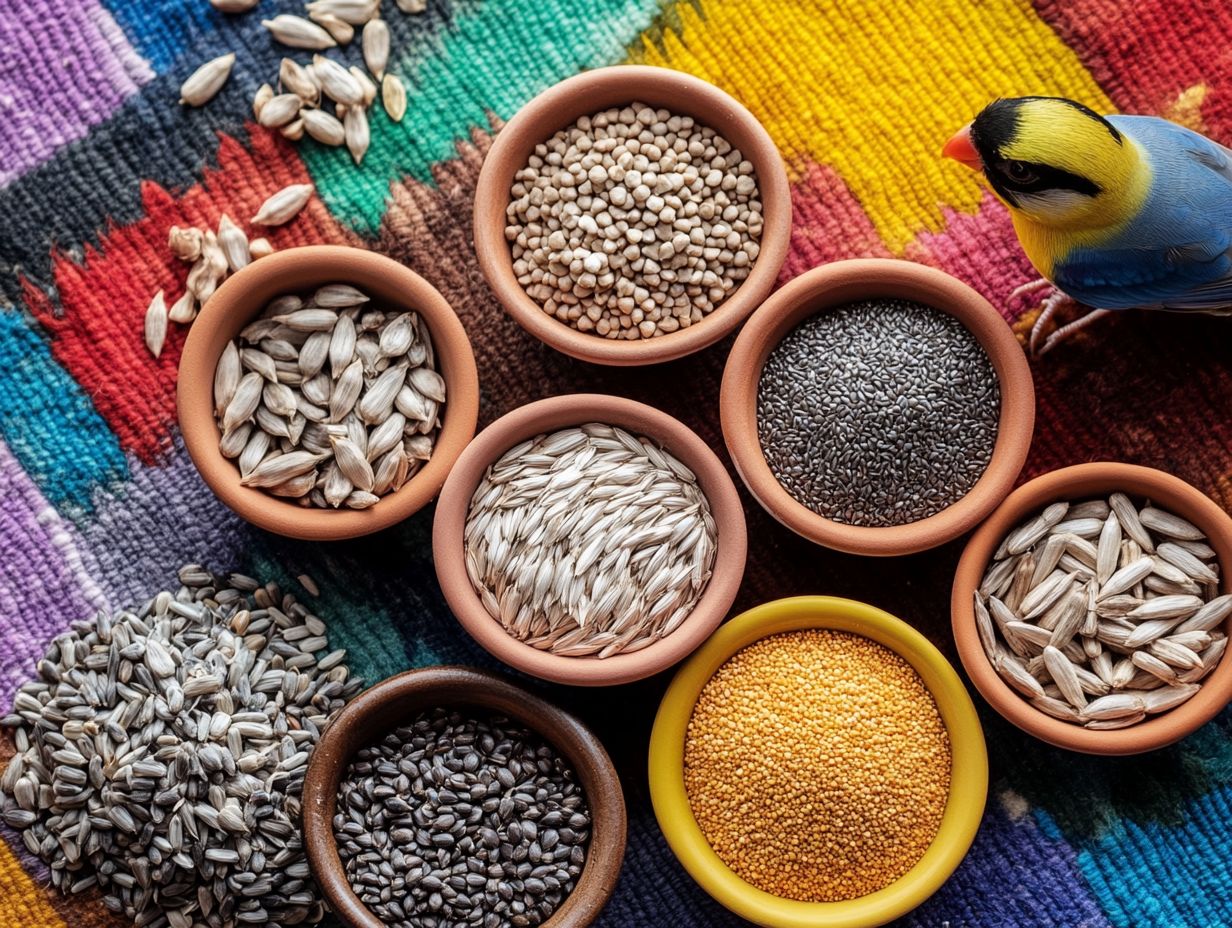
- Incorporating a variety of seeds into your pet bird’s diet provides important nutrients and health benefits.
- Avoid giving your pet bird seeds high in fat or lacking nutritional value, such as avocados or apple seeds.
- Seeds should make up no more than 20% of a pet bird’s daily diet and should be offered in moderation to prevent potential health risks.
1. Flax Seeds
Flax seeds are an exceptional addition to your pet bird’s diet, delivering essential nutrients that maintain a healthy lifestyle and prevent nutritional deficiencies.
Rich in healthy fats, especially omega-3 fatty acids, these seeds contribute to optimal feather quality and overall well-being. They integrate effortlessly into the bird food pyramid as a nutritious energy source that enhances a diverse, seed-based diet.
Avian veterinarians frequently advocate for the moderate inclusion of flax seeds. They not only enrich the nutritional profile of the food but also promote healthy digestion and bolster the immune system.
By regularly incorporating these tiny powerhouses into your feathered friend s meals, you can ensure they receive the vital nutrients needed for vibrant health and longevity.
2. Chia Seeds
Chia seeds are packed with omega-3 fatty acids and other essential nutrients, making them a splendid choice for enriching your pet bird’s diet.
These tiny powerhouses are full of vitamins, minerals, and antioxidants, which support overall health, promote vibrant feathers, and boost energy levels.
When introducing chia seeds, start with small amounts mixed into their regular food. This allows your birds to gradually adjust to the new texture and flavor.
Observing their reactions will guide you in determining the right quantity, helping to maintain a balanced diet without overwhelming them.
3. Sunflower Seeds
Sunflower seeds are an excellent choice for your pet birds, packed with energy-boosting fat content. However, balance them with healthy vegetables to prevent obesity.
These little powerhouses deliver a quick energy kick and act as a delightful treat that enhances their overall diet. Just remember, they shouldn’t be the star of the show in your bird’s meal plan.
To ensure your feathered companions receive a well-rounded intake of nutrients, pair sunflower seeds with a variety of fresh produce, like leafy greens and vibrant veggies.
This nutritious combination helps you avoid health risks associated with an unbalanced diet, such as unwanted weight gain.
Moderation is crucial; too many sunflower seeds can lead to dietary issues. Offering them as part of a diverse menu is essential to keep your birds healthy and lively.
4. Hemp Seeds
Hemp seeds are a treasure trove of protein and essential fatty acids, making them perfect for a well-rounded diet for your pet birds pursuing optimal nutrition.
These tiny nutritional powerhouses are brimming with a balanced assortment of vitamins and minerals, fostering robust overall health in your avian companions. Their impressive omega-3 and omega-6 fatty acid content supports healthy feather development and skin condition while providing the amino acids necessary for muscle growth and repair.
By incorporating hemp seeds into a varied diet, you enhance energy levels and help prevent deficiencies in essential nutrients. Whether you mix them into seed blends or offer them as a standalone treat, you ensure your feathered friends enjoy a well-rounded dietary boost.
Start incorporating these nutritious seeds today for a healthier pet bird!
5. Pumpkin Seeds
Pumpkin seeds serve as a nutritious treat for your pet birds. They are brimming with essential vitamins and minerals that can help address common health concerns while enhancing their overall well-being.
These little powerhouses are rich in magnesium, zinc, and healthy fats. They promote feather growth and strengthen the immune system, while also supporting digestive health.
Many avian veterinarians advocate for including pumpkin seeds in a bird’s diet. A balanced approach with other foods is essential to ensure comprehensive nutrition.
Depending on the size of your bird, offering a few seeds a few times a week can be beneficial. However, moderation is key; overfeeding can lead to obesity due to the higher fat content.
To make these wholesome treats more appealing, consider crushing the seeds or mixing them into their regular feed. This can help ease the introduction of pumpkin seeds into their daily routine, ensuring they enjoy their new snack while reaping all the nutritional benefits.
6. Sesame Seeds
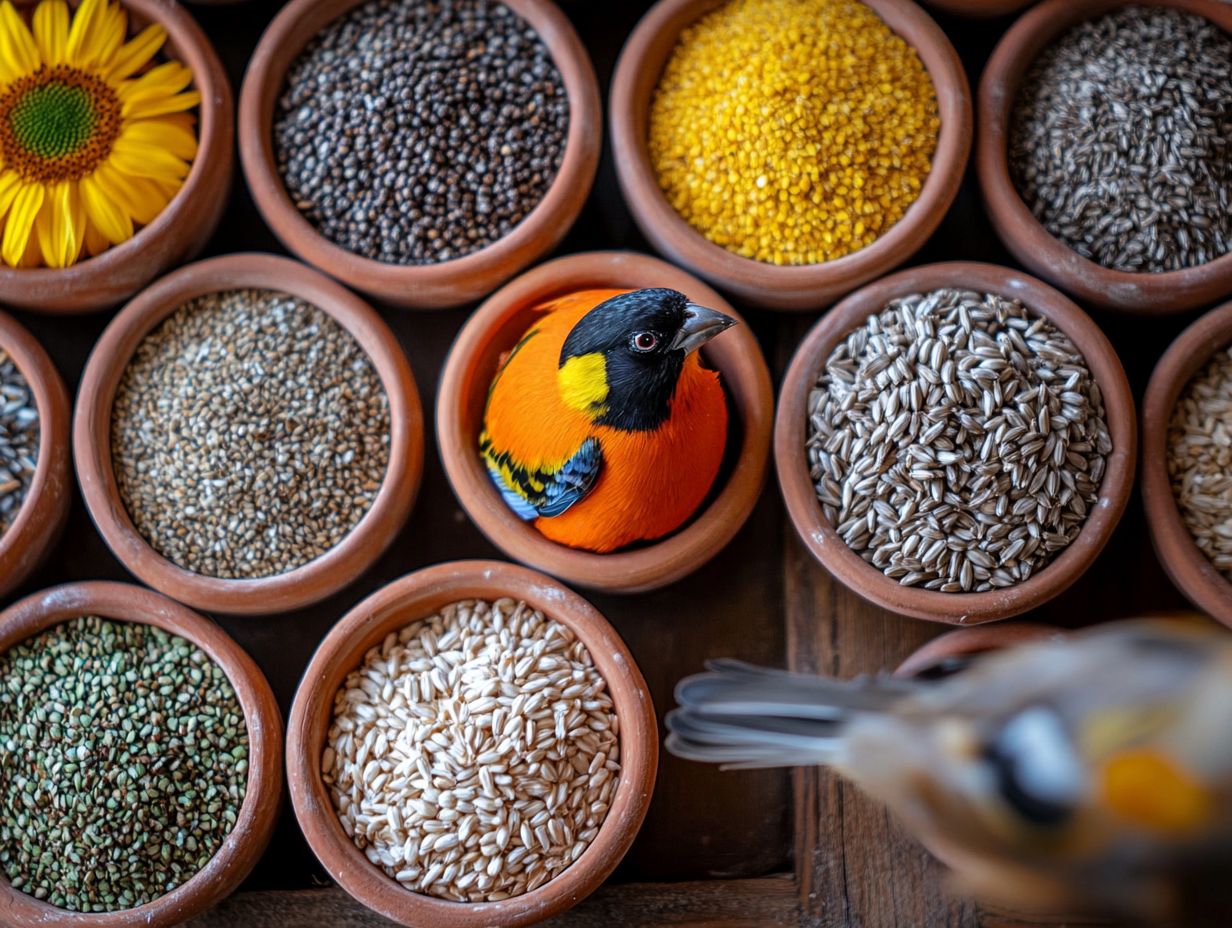
Sesame seeds, with their impressive nutritional profile, hold a vital place in the bird food pyramid. They contribute to a balanced diet when offered in moderation alongside fresh produce.
These small seeds are bursting with essential nutrients like calcium, iron, and healthy fats. This makes them an outstanding addition to a varied diet for your feathered companions.
Pair sesame seeds with leafy greens and other seed mixes to multiply the benefits. This creates a comprehensive meal that boosts energy levels and promotes overall well-being.
Incorporate sesame seeds into your birds’ diet to ensure they receive a rich array of vital minerals and vitamins. This enhances their health and vitality.
Plus, it encourages natural foraging behaviors, meaning they search for food like they would in the wild. This keeps their instincts sharp and satisfied.
7. Quinoa Seeds
Quinoa seeds are a great source of nutrition for your pet birds. They provide a complete feed option that caters to their diverse dietary needs and enhances overall health.
These versatile seeds are loaded with essential amino acids, vitamins, and minerals. They not only offer energy but also promote strong feather health and bolster immune function.
To effectively incorporate quinoa into your bird’s diet, mix it with other seeds, fresh fruits, and vegetables. This creates a stimulating and varied meal plan, ensuring your feathered friends receive a broad spectrum of nutrients.
Soaking or cooking quinoa enhances its digestibility. This allows your avian companions to reap the full benefits of this nutrient-dense superfood.
8. Millet Seeds
Millet seeds are a cornerstone of many seed mixes. They provide a nutritious foundation that delights pet birds and promotes a healthy diet when paired with fresh produce.
These tiny seeds are packed with essential vitamins and minerals, making them an outstanding energy source for your feathered friends. Incorporating millet seeds into a diet that includes a colorful array of healthy vegetables enhances their overall well-being.
Their versatility allows for seamless blending with greens like kale or spinach. This creates a delightful and balanced meal that satisfies both taste and nutritional requirements.
Plus, millet seeds are often easily digestible, making them suitable for birds of all ages. This ensures that each of your avian companions enjoys a well-rounded and nourishing diet.
9. Safflower Seeds
Safflower seeds are an excellent alternative to sunflower seeds. They offer a lower fat content while still providing essential nutrients that help prevent nutritional deficiencies in your pet birds.
These seeds are particularly beneficial if you aim to manage your birds’ weight. The reduced fat content lowers the risk of obesity and its associated health concerns. By adding safflower seeds to their diet, you can encourage a more varied palate and promote the intake of other healthy foods.
Rich in fiber and beneficial fatty acids, safflower seeds support overall digestive health. They contribute to a balanced diet that helps maintain energy levels and vitality.
Choosing safflower seeds can be pivotal in ensuring your pet bird enjoys a healthier, happier life.
10. Poppy Seeds
Poppy seeds can be a controversial ingredient in pet bird food. It’s important to approach their safety and the potential health concerns carefully.
While these tiny seeds may seem harmless, avian experts stress the need for a deeper understanding of their risks. Poppy seeds contain compounds that may lead to digestive issues or even toxicity in certain bird species if consumed excessively. Veterinarians who specialize in bird care often recommend consulting them before introducing such seeds into your birds diets.
To find the right balance, consider proper feeding strategies. For example, mix a small amount of poppy seeds with a variety of seeds and grains. This way, you can ensure your bird s diet remains safe and nutritionally balanced.
Why Are Seeds Important for Pet Birds?
Seeds serve as a crucial part of your pet bird’s diet, providing essential nutrition tailored to the dietary needs of various species. They promote overall health, especially when paired with fresh vegetables.
These tiny powerhouses are rich in energy, fats, and proteins, which are vital for maintaining optimal bodily function. Incorporating seeds into a balanced diet helps prevent deficiencies in essential vitamins and minerals. For the best results, it s vital to adopt a well-rounded dietary approach that includes grains, fruits, and leafy greens.
This variety satisfies your birds’ natural foraging instincts and enhances their well-being, ensuring they receive a wide spectrum of nutrients necessary for vibrant plumage and robust health.
What Types of Seeds Should Be Avoided for Pet Birds?
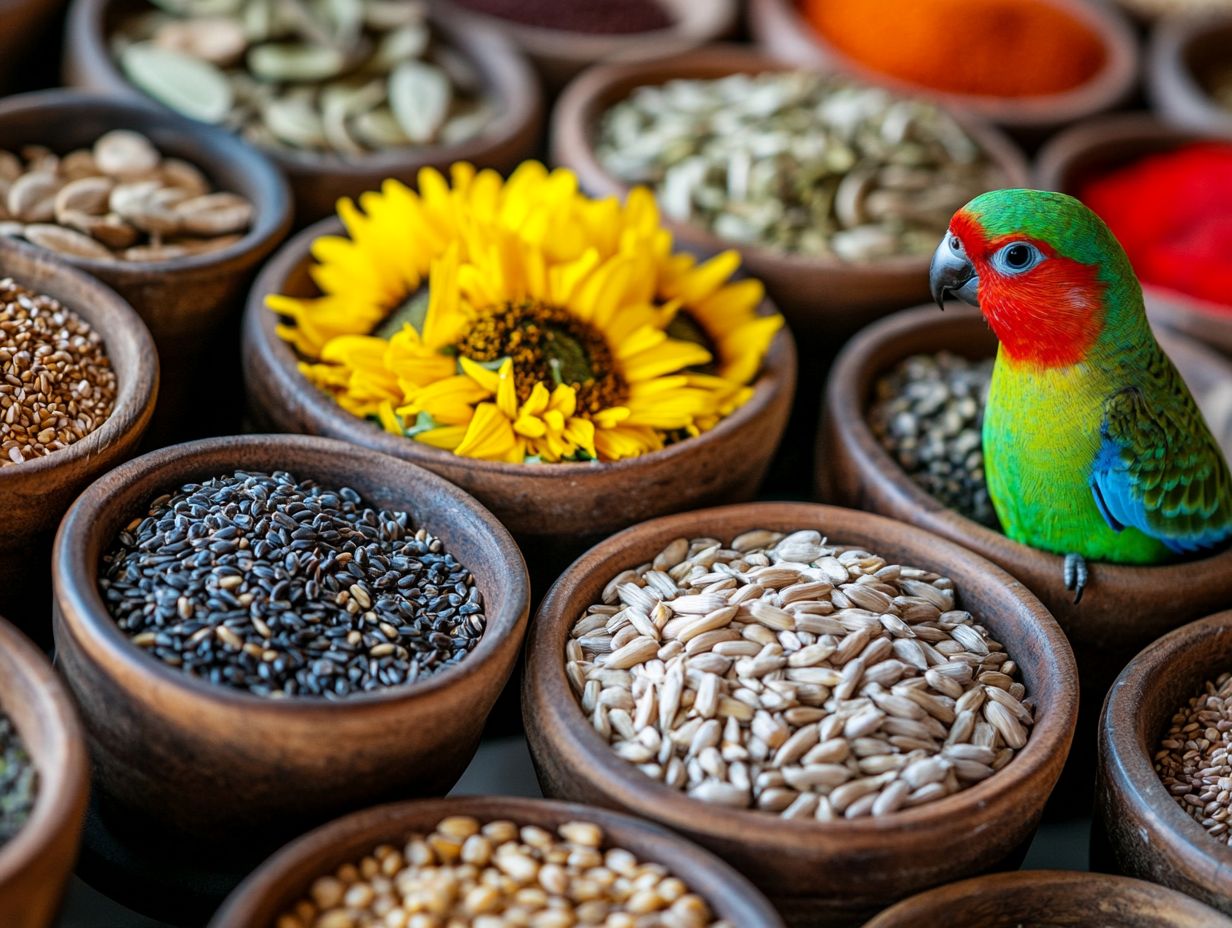
Certain seeds should be avoided for your pet birds due to potential health concerns. It’s crucial to consult an avian veterinarian for safe dietary choices and to understand which seeds are safe to offer.
For instance, seeds from fruit trees like apples and cherries, as well as those from avocados, contain harmful substances that can be toxic if ingested. The high-fat content in sunflower and safflower seeds can also lead to obesity and other metabolic disorders over time, resulting in significant health issues.
Avian health experts recommend incorporating a balanced diet rich in healthy vegetables, fruits, and specially formulated pellets tailored for specific bird species. Regularly assess your bird s diet and consult professionals who can guide you toward safe seeds and vitamin-rich options to ensure optimal health and vitality for your feathered friends.
Always consult your avian vet before changing your bird’s diet!
How Can Seeds Be Incorporated into a Balanced Diet for Pet Birds?
Incorporating seeds into a balanced diet for your pet birds requires thoughtful planning to ensure they receive a range of nutrients while steering clear of any lack of essential nutrients. This is crucial during the transition period when introducing new foods.
To achieve this, it s essential to mix various seed types, providing them with a well-rounded selection of fatty acids and proteins.
Alongside seeds, integrating fresh produce and healthy vegetables into their meals can supply vital vitamins and minerals. Offering slices of fruits like apples or berries can significantly enhance their diet. Don t overlook leafy greens such as spinach or kale, as they are crucial for adding necessary fiber and nutrients.
By combining these food groups, you not only promote a healthy digestive system but also keep mealtime exciting and engaging, fostering better eating habits for your feathered companions.
What Are the Health Benefits of Each Type of Seed?
Each type of seed offers unique health benefits for your pet birds, enhancing their overall nutrition and supporting various aspects of their well-being. This makes them essential in a seed-based diet.
For instance, sunflower seeds serve as a fantastic source of healthy fats, promoting energy levels and helping maintain those beautiful feathers.
On the other hand, sesame seeds deliver essential calcium, which plays a crucial role in bone strength and reproductive health. Flaxseeds, brimming with omega-3 fatty acids, are excellent for heart health and immune support, making them a wonderful addition to your bird’s diet.
Quinoa, being a complete protein source, provides vital amino acids essential for muscle development and overall vitality. By incorporating a diverse mix of these seeds, you can ensure your feathered friends receive optimal nutrition tailored to their specific health needs.
How Much and How Often Should Pet Birds Be Fed Seeds?
Feeding guidelines for seeds in pet birds can vary significantly depending on their species and dietary needs. It’s essential for you to determine how much and how often to feed them during the transition period.
It’s also important to consider factors like their fat content and the variety of seeds you offer to ensure a balanced intake. Understanding that each species has its unique requirements is crucial for ensuring optimal health.
For instance, while parrots may thrive on a mix of seeds, fruits, and vegetables for balanced nutrition, finches often do best with a seed-based diet that includes limited supplementation.
It s vital to introduce new foods gradually, allowing your bird’s digestive system to adapt and preventing potential gastrointestinal issues from sudden dietary changes.
Starting with small amounts of the new diet over several days can help your feathered friends make a smooth transition, ultimately resulting in happier, healthier companions.
Are There Any Risks Associated with Feeding Seeds to Pet Birds?
While seeds can certainly be a treat for your pet birds, it’s important to recognize the potential risks involved in their diet to safeguard their health and prevent nutrition health issues.
Relying too heavily on seeds may lead to nutritional imbalances, as they typically lack the essential vitamins and minerals that are vital for your bird’s overall well-being.
This excessive consumption can contribute to issues like obesity and shortened lifespans if not managed properly. Act now to prevent serious health issues down the road!
To reduce these risks, diversifying your bird’s diet is recommended with fresh fruits, vegetables, and high-quality pellets. By providing a well-rounded diet, you not only ensure your birds receive the necessary nutrients but also promote healthier foraging behavior, transforming mealtime into a more engaging and enriching experience.
Frequently Asked Questions
What are the top 10 nutritious seeds for my pet bird?
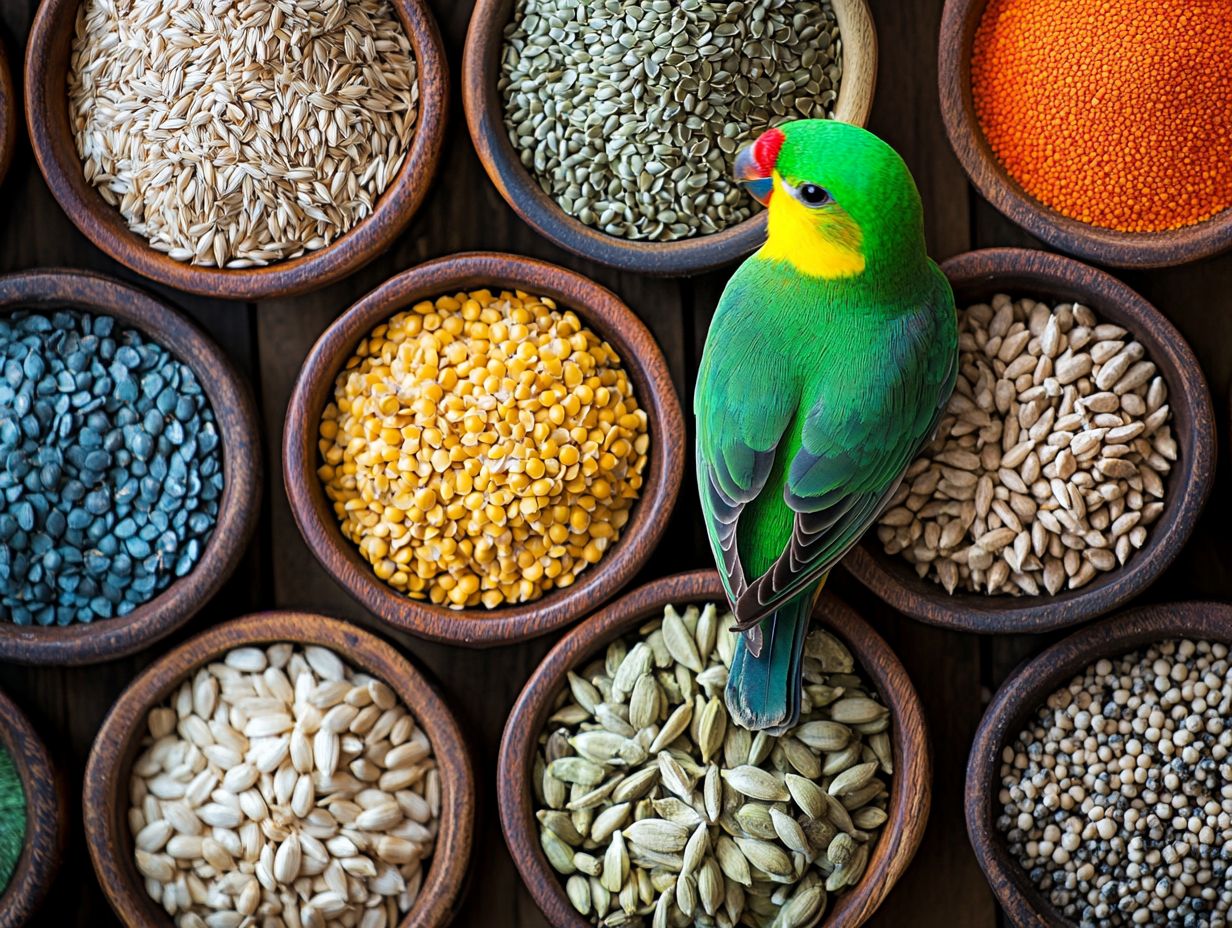
The top 10 nutritious seeds for your pet bird include sunflower seeds, pumpkin seeds, safflower seeds, flaxseeds, millet seeds, hemp seeds, sesame seeds, chia seeds, quinoa seeds, and canary seeds. These seeds are all excellent for a seed-based diet.
Why are these seeds considered nutritious for pet birds?
These seeds are nutritious because they contain high levels of protein, healthy fats, vitamins, and minerals. These nutrients are essential for your bird’s health and well-being.
Can I feed these seeds as the main diet for my pet bird?
No, these seeds should not be the main diet for your pet bird. They should be given in moderation as part of a balanced diet with fruits, vegetables, and pellets.
How should I offer these seeds to my pet bird?
You can mix these seeds with their regular food or place them in a separate dish. This way, your bird can enjoy them as a snack throughout the day.
Are there any seeds that are harmful to my pet bird?
Yes, some seeds can harm your bird if consumed in large quantities. For instance, apple seeds, peach pits, and avocado pits can be toxic. Always research and consult a veterinarian before introducing new foods.
Can I grow these seeds myself for my pet bird?
Absolutely! You can grow seeds like sunflower, pumpkin, and quinoa at home. Just make sure to learn about the proper growing and harvesting methods to ensure they re safe for your pet bird.

